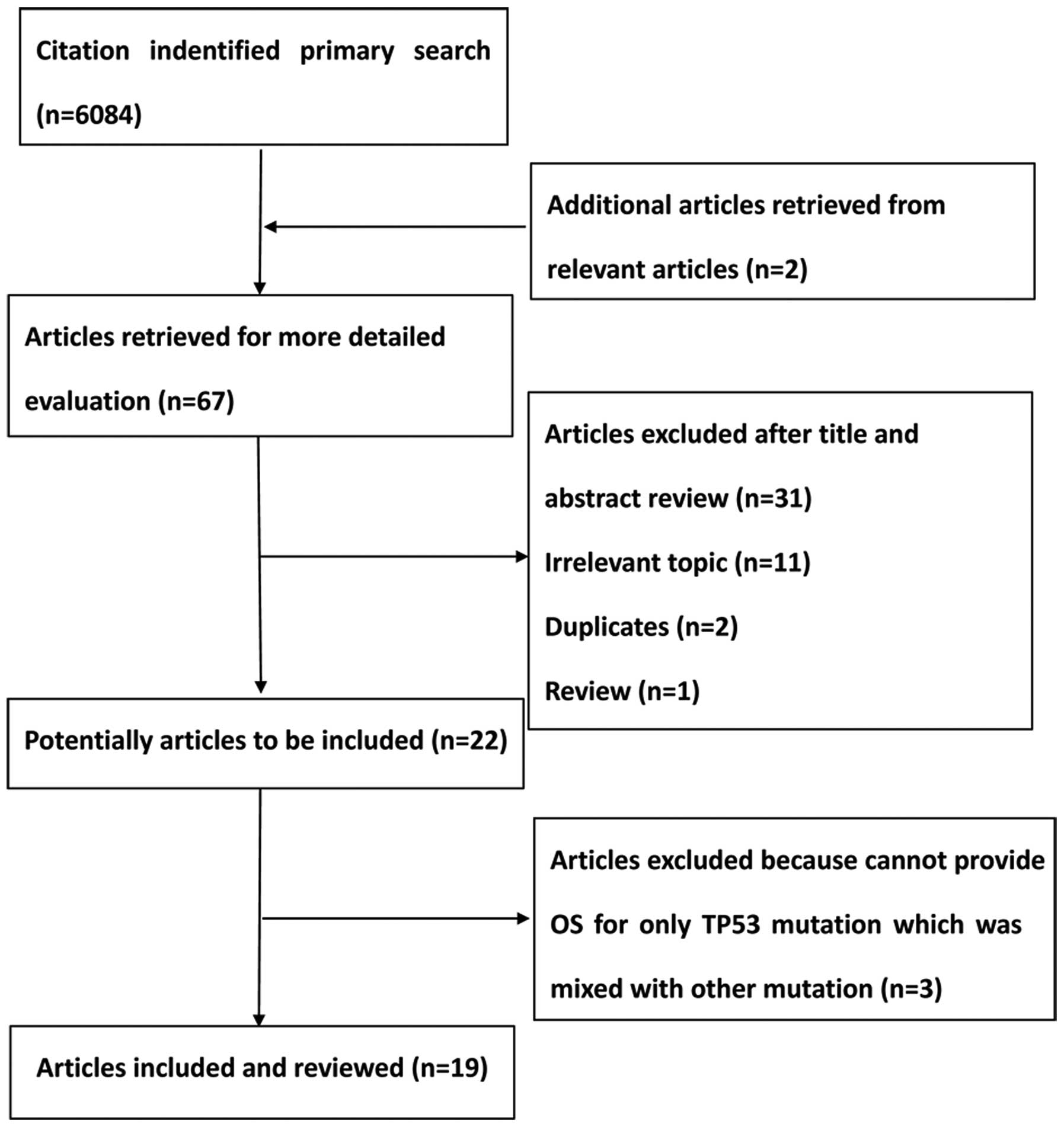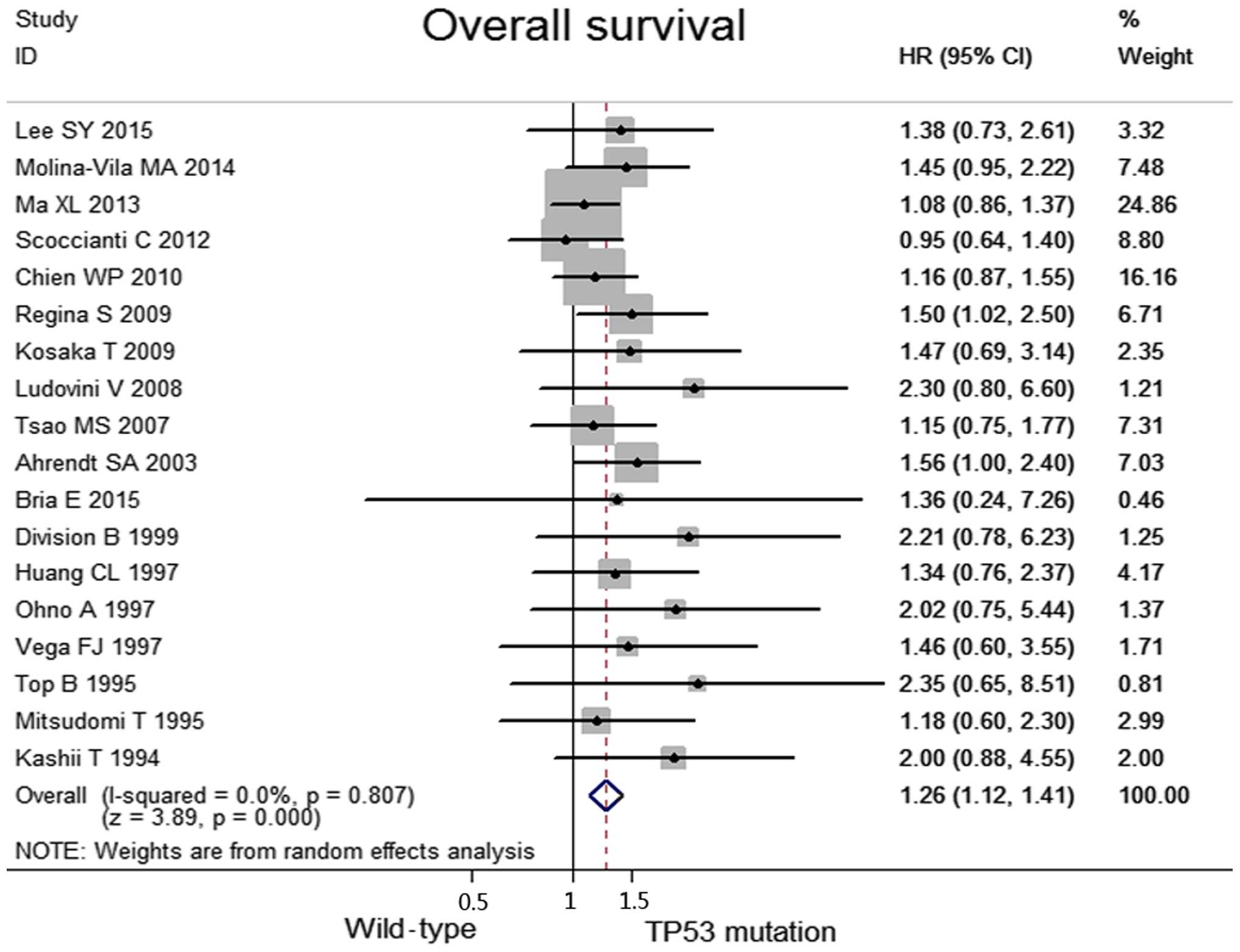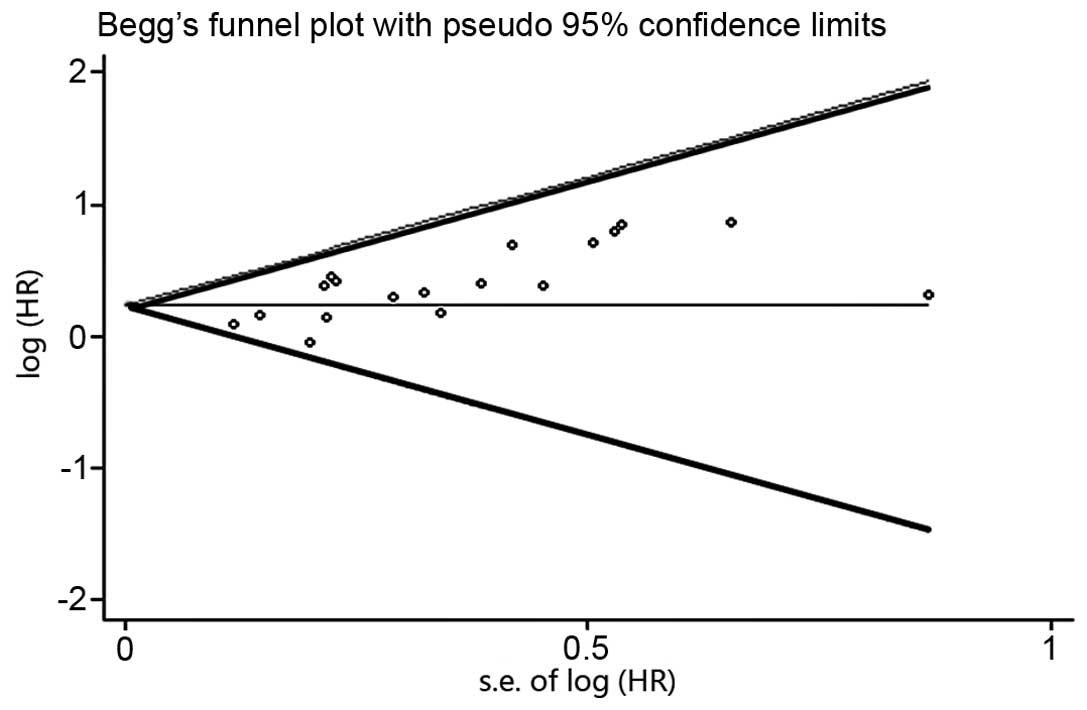|
1
|
Jemal A, Siegel R, Ward E, Hao Y, Xu J,
Murray T and Thun MJ: Cancer statistics, 2008. CA Cancer J Clin.
58:71–96. 2008. View Article : Google Scholar : PubMed/NCBI
|
|
2
|
Ihde DC and Minna JD: Non-small cell lung
cancer. Part II: Treatment. Curr Probl Cancer. 15:105–154. 1991.
View Article : Google Scholar : PubMed/NCBI
|
|
3
|
Farjah F, Flum DR, Ramsey SD, Heagerty PJ,
Symons RG and Wood DE: Multi-modality mediastinal staging for lung
cancer among medicare beneficiaries. J Thorac Oncol. 4:355–363.
2009. View Article : Google Scholar : PubMed/NCBI
|
|
4
|
Goldstein I, Marcel V, Olivier M, Oren M,
Rotter V and Hainaut P: Understanding wild-type and mutant p53
activities in human cancer: New landmarks on the way to targeted
therapies. Cancer Gene Ther. 18:2–11. 2011. View Article : Google Scholar : PubMed/NCBI
|
|
5
|
Singhal S, Vachani A, Antin-Ozerkis D,
Kaiser LR and Albelda SM: Prognostic implications of cell cycle,
apoptosis, and angiogenesis biomarkers in non-small cell lung
cancer: A review. Clin Cancer Res. 11:3974–3986. 2005. View Article : Google Scholar : PubMed/NCBI
|
|
6
|
Toyooka S, Tsuda T and Gazdar AF: The TP53
gene, tobacco exposure, and lung cancer. Hum Mutat. 21:229–239.
2003. View Article : Google Scholar : PubMed/NCBI
|
|
7
|
Greenblatt MS, Bennett WP, Hollstein M and
Harris CC: Mutations in the p53 tumor suppressor gene: Clues to
cancer etiology and molecular pathogenesis. Cancer Res.
54:4855–4878. 1994.PubMed/NCBI
|
|
8
|
Steels E, Paesmans M, Berghmans T, Branle
F, Lemaitre F, Mascaux C, Meert AP, Vallot F, Lafitte JJ and
Sculier JP: Role of p53 as a prognostic factor for survival in lung
cancer: A systematic review of the literature with a meta-analysis.
Eur Respir J. 18:705–719. 2001. View Article : Google Scholar : PubMed/NCBI
|
|
9
|
Tsao MS, Aviel-Ronen S, Ding K, Lau D, Liu
N, Sakurada A, Whitehead M, Zhu CQ, Livingston R, Johnson DH, et
al: Prognostic and predictive importance of p53 and RAS for
adjuvant chemotherapy in non small-cell lung cancer. J Clin Oncol.
25:5240–5247. 2007. View Article : Google Scholar : PubMed/NCBI
|
|
10
|
Bodner SM, Minna JD, Jensen SM, D'Amico D,
Carbone D, Mitsudomi T, Fedorko J, Buchhagen DL, Nau MM, Gazdar AF,
et al: Expression of mutant p53 proteins in lung cancer correlates
with the class of p53 gene mutation. Oncogene. 7:743–749.
1992.PubMed/NCBI
|
|
11
|
Lohmann D, Ruhri C, Schmitt M, Graeff H
and Höfler H: Accumulation of p53 protein as an indicator for p53
gene mutation in breast cancer. Occurrence of false-positives and
false-negatives. Diagn Mol Pathol. 2:36–41. 1993. View Article : Google Scholar : PubMed/NCBI
|
|
12
|
Harris CC and Hollstein M: Clinical
implications of the p53 tumor-suppressor gene. N Engl J Med.
329:1318–1327. 1993. View Article : Google Scholar : PubMed/NCBI
|
|
13
|
Mitsudomi T, Hamajima N, Ogawa M and
Takahashi T: Prognostic significance of p53 alterations in patients
with non-small cell lung cancer: A meta-analysis. Clin Cancer Res.
6:4055–4063. 2000.PubMed/NCBI
|
|
14
|
Huncharek M, Kupelnick B, Geschwind JF and
Caubet JF: Prognostic significance of p53 mutations in non-small
cell lung cancer: A meta-analysis of 829 cases from eight published
studies. Cancer Lett. 153:219–226. 2000. View Article : Google Scholar : PubMed/NCBI
|
|
15
|
Kosaka T, Yatabe Y, Onozato R, Kuwano H
and Mitsudomi T: Prognostic implication of EGFR, KRAS, and TP53
gene mutations in a large cohort of Japanese patients with
surgically treated lung adenocarcinoma. J Thorac Oncol. 4:22–29.
2009. View Article : Google Scholar : PubMed/NCBI
|
|
16
|
Fukuyama Y, Mitsudomi T, Sugio K, Ishida
T, Akazawa K and Sugimachi K: K-ras and p53 mutations are an
independent unfavourable prognostic indicator in patients with
non-small-cell lung cancer. Br J Cancer. 75:1125–1130. 1997.
View Article : Google Scholar : PubMed/NCBI
|
|
17
|
Mitsudomi T, Oyama T, Kusano T, Osaki T,
Nakanishi R and Shirakusa T: Mutations of the p53 gene as a
predictor of poor prognosis in patients with non-small-cell lung
cancer. J Natl Cancer Inst. 85:2018–2023. 1993. View Article : Google Scholar : PubMed/NCBI
|
|
18
|
Tomizawa Y, Kohno T, Fujita T, Kiyama M,
Saito R, Noguchi M, Matsuno Y, Hirohashi S, Yamaguchi N, Nakajima T
and Yokota J: Correlation between the status of the p53 gene and
survival in patients with stage I non-small cell lung carcinoma.
Oncogene. 18:1007–1014. 1999. View Article : Google Scholar : PubMed/NCBI
|
|
19
|
Lee SY, Jeon HS, Hwangbo Y, Jeong JY, Park
JY, Lee EJ, Jin G, Shin KM, Yoo SS, Lee J, et al: The influence of
TP53 mutations on the prognosis of patients with early stage
non-small cell lung cancer may depend on the intratumor
heterogeneity of the mutations. Mol Carcinog. 54:93–101. 2015.
View Article : Google Scholar : PubMed/NCBI
|
|
20
|
Scoccianti C, Vesin A, Martel G, Olivier
M, Brambilla E, Timsit JF, Tavecchio L, Brambilla C, Field JK and
Hainaut P: European Early Lung Cancer Consortium: Prognostic value
of TP53, KRAS and EGFR mutations in nonsmall cell lung cancer: The
EUELC cohort. Eur Respir J. 40:177–184. 2012. View Article : Google Scholar : PubMed/NCBI
|
|
21
|
Ma X, Rousseau V, Sun H, Lantuejoul S,
Filipits M, Pirker R, Popper H, Mendiboure J, Vataire AL, Le
Chevalier T, et al: Significance of TP53 mutations as predictive
markers of adjuvant cisplatin-based chemotherapy in completely
resected non-small-cell lung cancer. Mol Oncol. 8:555–564. 2014.
View Article : Google Scholar : PubMed/NCBI
|
|
22
|
Chien WP, Wong RH, Cheng YW, Chen CY and
Lee H: Associations of MDM2 SNP309, transcriptional activity, mRNA
expression, and survival in stage I non-small-cell lung cancer
patients with wild-type p53 tumors. Ann Surg Oncol. 17:1194–1202.
2010. View Article : Google Scholar : PubMed/NCBI
|
|
23
|
Parmar MK, Torri V and Stewart L:
Extracting summary statistics to perform meta-analyses of the
published literature for survival endpoints. Stat Med.
17:2815–2834. 1998. View Article : Google Scholar : PubMed/NCBI
|
|
24
|
Williamson PR, Smith CT, Hutton JL and
Marson AG: Aggregate data meta-analysis with time-to-event
outcomes. Stat Med. 21:3337–3351. 2002. View Article : Google Scholar : PubMed/NCBI
|
|
25
|
Stang A: Critical evaluation of the
Newcastle-Ottawa scale for the assessment of the quality of
nonrandomized studies in meta-analyses. Eur J Epidemiol.
25:603–605. 2010. View Article : Google Scholar : PubMed/NCBI
|
|
26
|
Begg CB and Mazumdar M: Operating
characteristics of a rank correlation test for publication bias.
Biometrics. 50:1088–1101. 1994. View
Article : Google Scholar : PubMed/NCBI
|
|
27
|
Egger M, Smith G Davey, Schneider M and
Minder C: Bias in meta-analysis detected by a simple, graphical
test. BMJ. 315:629–634. 1997. View Article : Google Scholar : PubMed/NCBI
|
|
28
|
Top B, Mooi WJ, Klaver SG, Boerrigter L,
Wisman P, Elbers HR, Visser S and Rodenhuis S: Comparative analysis
of p53 gene mutations and protein accumulation in human
non-small-cell lung cancer. Int J Cancer. 64:83–91. 1995.
View Article : Google Scholar : PubMed/NCBI
|
|
29
|
Kashii T, Mizushima Y, Lima C, Noto H,
Sato H, Saito H, Kusajima Y, Kitagawa M, Sugiyama S and Kobayashi
M: Evaluation of prognostic-significance of p53 gene alterations in
patients with surgically resected lung-cancer. Int J Oncol.
6:123–128. 1995.PubMed/NCBI
|
|
30
|
Regina S, Valentin JB, Lachot S, Lemarié
E, Rollin J and Gruel Y: Increased tissue factor expression is
associated with reduced survival in non-small cell lung cancer and
with mutations of TP53 and PTEN. Clin Chem. 55:1834–1842. 2009.
View Article : Google Scholar : PubMed/NCBI
|
|
31
|
Huang CL, Taki T, Adachi M, Konishi T,
Higashiyama M, Kinoshita M, Hadama T and Miyake M: Mutations of p53
and K-ras genes as prognostic factors for non-small cell lung
cancer. Int J Oncol. 12:553–563. 1998.PubMed/NCBI
|
|
32
|
Molina-Vila MA, Bertran-Alamillo J, Gascó
A, Mayo-de-las-Casas C, Sánchez-Ronco M, Pujantell-Pastor L,
Bonanno L, Favaretto AG, Cardona AF, Vergnenègre A, et al:
Nondisruptive p53 mutations are associated with shorter survival in
patients with advanced non-small cell lung cancer. Clin Cancer Res.
20:4647–4659. 2014. View Article : Google Scholar : PubMed/NCBI
|
|
33
|
Vega FJ, Iniesta P, Caldés T, Sanchez A,
López JA, de Juan C, Diaz-Rubio E, Torres A, Balibrea JL and Benito
M: p53 Exon 5 mutations as a prognostic indicator of shortened
survival in non-small-cell lung cancer. Br J Cancer. 76:44–51.
1997. View Article : Google Scholar : PubMed/NCBI
|
|
34
|
Ahrendt SA, Hu Y, Buta M, McDermott MP,
Benoit N, Yang SC, Wu L and Sidransky D: p53 mutations and survival
in stage I non-small-cell lung cancer: Results of a prospective
study. J Natl Cancer Inst. 95:961–970. 2003. View Article : Google Scholar : PubMed/NCBI
|
|
35
|
Mitsudomi T, Oyama T, Nishida K, Ogami A,
Osaki T, Nakanishi R, Sugio K, Yasumoto K and Sugimachi K: p53
nuclear immunostaining and gene mutations in non-small-cell lung
cancer and their effects on patient survival. Ann Oncol. 6:(Suppl
3). S9–S13. 1995. View Article : Google Scholar : PubMed/NCBI
|
|
36
|
Ohno A, Hirashima T, Kubo A, Masuda N,
Takada M, Fujiwara H, Yasumitsu T, Kikui M, Fukuoka M and Nakagawa
K: p53 status and prognosis in stage I–IIIa non-small cell lung
cancer. Int J Oncol. 10:521–528. 1997.PubMed/NCBI
|
|
37
|
Ludovini V, Pistola L, Gregorc V, Floriani
I, Rulli E, Piattoni S, Di Carlo L, Semeraro A, Darwish S,
Tofanetti FR, et al: Plasma DNA, microsatellite alterations, and
p53 tumor mutations are associated with disease-free survival in
radically resected non-small cell lung cancer patients: A study of
the perugia multidisciplinary team for thoracic oncology. J Thorac
Oncol. 3:365–373. 2008. View Article : Google Scholar : PubMed/NCBI
|
|
38
|
Horio Y, Takahashi T, Kuroishi T, Hibi K,
Suyama M, Niimi T, Shimokata K, Yamakawa K, Nakamura Y, Ueda R, et
al: Prognostic significance of p53 mutations and 3p deletions in
primary resected non-small cell lung cancer. Cancer Res. 53:1–4.
1993.PubMed/NCBI
|
|
39
|
Schiller JH, Adak S, Feins RH, Keller SM,
Fry WA, Livingston RB, Hammond ME, Wolf B, Sabatini L, Jett J, et
al: Lack of prognostic significance of p53 and K-ras mutations in
primary resected non-small-cell lung cancer on E4592: A laboratory
ancillary study on an eastern cooperative oncology group
prospective randomized trial of postoperative adjuvant therapy. J
Clin Oncol. 19:448–457. 2001.PubMed/NCBI
|
|
40
|
Tolbert DM, Noffsinger AE, Miller MA,
DeVoe GW, Stemmermann GN, Macdonald JS and Fenoglio-Preiser CM: p53
immunoreactivity and single-strand conformational polymorphism
analysis often fail to predict p53 mutational status. Mod Pathol.
12:54–60. 1999.PubMed/NCBI
|
|
41
|
Meinhold-Heerlein I, Ninci E, Ikenberg H,
Brandstetter T, Ihling C, Schwenk I, Straub A, Schmitt B,
Bettendorf H, Iggo R and Bauknecht T: Evaluation of methods to
detect p53 mutations in ovarian cancer. Oncology. 60:176–188. 2001.
View Article : Google Scholar : PubMed/NCBI
|
|
42
|
Fong KM, Kida Y, Zimmerman PV, Ikenaga M
and Smith PJ: Loss of heterozygosity frequently affects chromosome
17q in non-small cell lung cancer. Cancer Res. 55:4268–4272.
1995.PubMed/NCBI
|
|
43
|
Sozzi G, Miozzo M, Donghi R, Pilotti S,
Cariani CT, Pastorino U, Porta G Della and Pierotti MA: Deletions
of 17p and p53 mutations in preneoplastic lesions of the lung.
Cancer Res. 52:6079–6082. 1992.PubMed/NCBI
|
|
44
|
Ahrendt SA, Hu Y, Buta M, McDermott MP,
Benoit N, Yang SC, Wu L and Sidransky D: p53 mutations and survival
in stage I non-small-cell lung cancer: Results of a prospective
study. J Natl Cancer Inst. 95:961–970. 2003. View Article : Google Scholar : PubMed/NCBI
|
|
45
|
Poeta ML, Manola J, Goldwasser MA,
Forastiere A, Benoit N, Califano JA, Ridge JA, Goodwin J, Kenady D,
Saunders J, et al: TP53 mutations and survival in squamous-cell
carcinoma of the head and neck. N Engl J Med. 357:2552–2561. 2007.
View Article : Google Scholar : PubMed/NCBI
|
|
46
|
Cho Y, Gorina S, Jeffrey PD and Pavletich
NP: Crystal structure of a p53 tumor suppressor-DNA complex:
Understanding tumorigenic mutations. Science. 265:346–355. 1994.
View Article : Google Scholar : PubMed/NCBI
|
|
47
|
Chiba I, Takahashi T, Nau MM, D'Amico D,
Curiel DT, Mitsudomi T, Buchhagen DL, Carbone D, Piantadosi S, Koga
H, et al: Mutations in the p53 gene are frequent in primary,
resected non-small cell lung cancer. Lung Cancer Study Group.
Oncogene. 5:1603–1610. 1990.PubMed/NCBI
|
|
48
|
Soussi T and Béroud C: Assessing TP53
status in human tumours to evaluate clinical outcome. Nat Rev
Cancer. 1:233–240. 2001. View Article : Google Scholar : PubMed/NCBI
|
|
49
|
Bria E, Pilotto S, Amato E, Fassan M,
Novello S, Peretti U, Vavalà T, Kinspergher S, Righi L, Santo A, et
al: Molecular heterogeneity assessment by next-generation
sequencing and response to gefitinib of EGFR mutant advanced lung
adenocarcinoma. Oncotarget. 6:12783–12795. 2015. View Article : Google Scholar : PubMed/NCBI
|

















